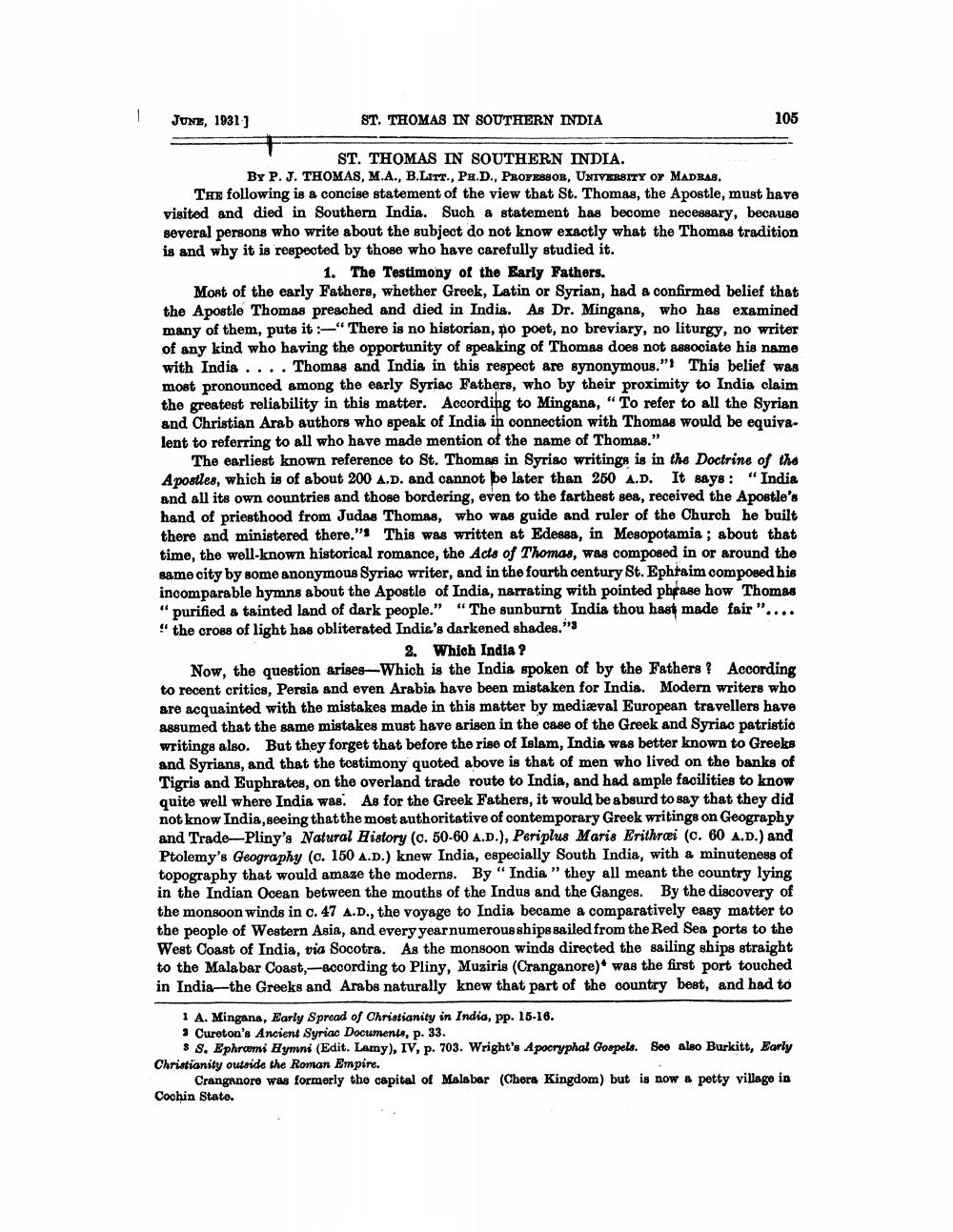________________
JUNE, 1931)
ST. THOMAS IN SOUTHERN INDIA
105
ST. THOMAS IN SOUTHERN INDIA. BY P.J. THOMAS, M.A., B.LITT., PH.D., PROFESSOR, UNIVERSITY OF MADRAS. The following is a concise statement of the view that St. Thomas, the Apostle, must have visited and died in Southern India. Such a statement has become necessary, because several persons who write about the subject do not know exactly what the Thomas tradition is and why it is respected by those who have carefully studied it.
1. The Testimony of the Early Fathers. Most of the early Fathers, whether Greek, Latin or Syrian, had a confirmed belief that the Apostle Thomas preached and died in India. As Dr. Mingana, who has examined many of them, puts it "There is no historian, po poet, no breviary, no liturgy, no writer of any kind who having the opportunity of speaking of Thomas does not associate his name with India .... Thomas and India in this respect are synonymous." This belief was most pronounced among the early Syriac Fathers, who by their proximity to India claim the greatest reliability in this matter. According to Mingana, "To refer to all the Syrian and Christian Arab authors who speak of India in connection with Thomas would be equivalent to referring to all who have made mention of the name of Thomas."
The earliest known reference to St. Thomas in Syriac writings is in the Doctrine of the Apostles, which is of about 200 A.D. and cannot be later than 250 A.D. It says: "India and all its own countries and those bordering, even to the farthest sea, received the Apostle's hand of priesthood from Judas Thomas, who was guide and ruler of the Church he built there and ministered there." This was written at Edessa, in Mesopotamia; about that time, the well-known historical romance, the Acts of Thomas, WAS composed in or around the same city by some anonymous Syriac writer, and in the fourth century St. Ephraim composed his incomparable hymns about the Apostle of India, narrating with pointed phrase how Thomas "purified a tainted land of dark people." "The sunburnt India thou hast made fair".... "the cross of light has obliterated India's darkened shades."
2. Which India ? Now, the question arises-Which is the India spoken of by the Fathers ? According to recent critics, Persia and even Arabia have been mistaken for India. Modern writers who are acquainted with the mistakes made in this matter by mediæval European travellers have assumed that the same mistakes must have arisen in the case of the Greek and Syriac patristic writings also. But they forget that before the rise of Islam, India was better known to Greeks and Syrians, and that the testimony quoted above is that of men who lived on the banks of Tigris and Euphrates, on the overland trade route to India, and had ample facilities to know quite well where India was. As for the Greek Fathers, it would be absurd to say that they did not know India, seeing that the most authoritative of contemporary Greek writings on Geography and Trade-Pliny's Natural History (c. 50-60 A.D.), Periplus Maris Erithræi (c. 60 A.D.) and Ptolemy's Geography (c. 150 A.D.) knew India, especially South India, with a minuteness of topography that would amaze the moderns. By "India" they all meant the country lying in the Indian Ocean between the mouths of the Indus and the Ganges. By the discovery of the monsoon winds in c. 47 A.D., the voyage to India became a comparatively easy matter to the people of Western Asia, and every year numerous ships sailed from the Red Sea ports to the West Coast of India, via Socotra. As the monsoon winds directed the sailing ships straight to the Malabar Coast,-according to Pliny, Muziris (Cranganore)* was the first port touched in India--the Greeks and Arabs naturally knew that part of the country best, and had to
1 A. Mingana, Early Spread of Christianity in India, pp. 15-16.
Cureton's Ancient Syriac Documento, p. 33.
3 S. Ephroomi Hymni (Edit. Lamy), IV, p. 703. Wright's Apocryphal Gospels. See also Burkitt, Early Christianity outside the Roman Empire.
Cranganore was formerly the capital of Malabar (Chera Kingdom) but is now & petty village in Cochin State.




